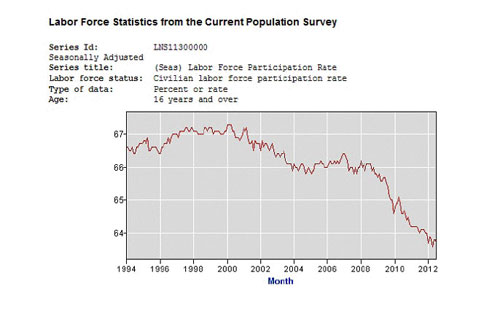President Obama is running scared from the Reagan Metric
"Are you better off than you were four years ago?" seems like a simple question. But for Team Obama, it's clearly terrifying


A free daily email with the biggest news stories of the day – and the best features from TheWeek.com
You are now subscribed
Your newsletter sign-up was successful
Give Barack Obama and the Democrats credit. In 2008, Obama won election as the candidate of Hope and Change — while being the first major-party nominee to eschew federal campaign spending limits since Watergate. Now, in 2012, Obama wants to be the first incumbent president to avoid answering the ingenious question devised by Ronald Reagan, which devastated Jimmy Carter's attempt to win a second term in office. Call it the Reagan Metric: Are you better off than you were four years ago?
Democrats fell all over themselves this weekend when asked the most predictable question in presidential politics. David Axelrod and David Plouffe refused to give a direct answer when challenged on Sunday morning talk shows. Maryland Gov. Martin O'Malley had the misfortune of being a little too honest on CBS' Face the Nation. When Bob Schieffer asked if O'Malley could honestly claim that voters were better off after four years, the Democratic governor responded, "No, but that's not the question for this election." By Monday, O'Malley had reversed himself and claimed that the positive jobs growth over the last 38 months shows that Americans are better off. "Clearly we're moving forward, we're creating jobs, unemployment is down, job creation is up," O'Malley claimed on CNN's Starting Point. "And that job creation would not happen without the president's leadership."
Just the existence of this question frames the election as a referendum on a failed administration.
The Week
Escape your echo chamber. Get the facts behind the news, plus analysis from multiple perspectives.

Sign up for The Week's Free Newsletters
From our morning news briefing to a weekly Good News Newsletter, get the best of The Week delivered directly to your inbox.
From our morning news briefing to a weekly Good News Newsletter, get the best of The Week delivered directly to your inbox.
O'Malley was on more solid ground with his original answer. Even the Obama administration predicted we'd see stronger job growth over the last three years, with or without the stimulus package, than we've actually seen. This now-notorious chart from Christina Romer's stimulus proposal predicted that the stimulus would accelerate hiring and keep unemployment below 8 percent, but that even a continuation of previous economic policy would produce an unemployment rate of 6 percent by the third quarter of 2012, only slightly higher than without the stimulus:
Instead of keeping unemployment under 8 percent, of course, the $800 billion stimulus — entirely funded through debt — failed to reduce unemployment at all. The last time the official jobless rate fell below 8 percent was January 2009. The stimulus package passed in early February 2009, when the jobless rate was 8.3 percent. That's the same rate as today.
However, that doesn't mean that we've maintained the status quo, either. The jobless rate is based in part on the size of the workforce. As the workforce grows smaller, the jobless rate will decline even when the number of jobs remains static. In two separate measures from the Bureau of Labor Statistics, the workforce has shrunk to generational lows since the start of the Obama recovery. The employment-to-population ratio, which measures the proportion of working age adults who are employed, was 60.6 percent when Obama took office, and 59.4 percent when the recovery began in June 2009. It's now 58.4 percent.

The debacle from the responses Sunday and Monday seems to have pushed President Obama and his campaign into a new argument to avoid the Reagan Metric. In an interview Monday evening with a television station in Colorado Springs, the reporter asked Obama to grade himself on the economy. "You know," Obama answered, "I would say 'incomplete.'" The next day, deputy campaign manager Stephanie Cutter enthusiastically endorsed this when a skeptical Jake Tapper asked whether that answer would "cut it." "Yeah, it does," Cutter responded, pointing to the massive job losses before Obama took office, and claiming that Obama turned the losses into job growth. "But when he's saying incomplete," Cutter continued, "it means a number of different things. One: We're on a path forward. You know, we're on our way up."
A free daily email with the biggest news stories of the day – and the best features from TheWeek.com
The chart above shows the actual direction taken on jobs. Further data on incomes only underscores the decline that characterizes the Obama recovery. Median household incomes dropped faster during the recovery than they did during the recession, according to a study published last week by Sentier Research based on Census Bureau data. Small wonder that consumer confidence as measured by Gallup on the day that the Democratic convention opens has dropped back to a year-long low, roughly at the same level as the beginning of the recovery in mid-2009.
Obama's new strategy has its pitfalls. To convince voters to accept an "incomplete" as a first-term grade, Democrats need to put forward a detailed agenda for a second term that addresses the shortcomings of the first Obama term. So far, though, Obama has said little about his second-term agenda, focusing almost entirely on pointing out Mitt Romney's flaws as a potential president instead. Neither the president nor his party has offered much more than "Forward," the campaign slogan, and National Journal's Major Garrett reported this week that Democrats in Charlotte are as bemused by the question of a second-term agenda as anyone else. Democratic strategist Joe Trippi couldn't define "Forward" for Garrett either, admitting that "nobody really knows what that means."
This is why Democrats want to avoid the Reagan Metric. Just the existence of this question frames the election as a referendum on a failed administration. Obama needs to convince people that Mitt Romney is such a bad alternative that the only answer is another four years of economic policies that Democrats won't defend now. If Obama succeeds in winning a second term on that basis, with no agenda for new policies, while less than a third of likely voters believe that he has won the Reagan Metric, it will indeed make history — and set a record for cynicism and despair in American politics.
Read more political coverage at The Week's 2012 Election Center.
Edward Morrissey has been writing about politics since 2003 in his blog, Captain's Quarters, and now writes for HotAir.com. His columns have appeared in the Washington Post, the New York Post, The New York Sun, the Washington Times, and other newspapers. Morrissey has a daily Internet talk show on politics and culture at Hot Air. Since 2004, Morrissey has had a weekend talk radio show in the Minneapolis/St. Paul area and often fills in as a guest on Salem Radio Network's nationally-syndicated shows. He lives in the Twin Cities area of Minnesota with his wife, son and daughter-in-law, and his two granddaughters. Morrissey's new book, GOING RED, will be published by Crown Forum on April 5, 2016.
-
 Winter Olympics end with US men’s hockey gold
Winter Olympics end with US men’s hockey goldSpeed Read The US men’s hockey team beat Canada to win their first Olympic gold medal since 1980
-
 Mexico kills drug lord El Mencho, sparking chaos
Mexico kills drug lord El Mencho, sparking chaosSpeed Read Cartel members responded with a wave of retaliatory violence across the country
-
 Trump’s tariff loss at Supreme Court roils trade
Trump’s tariff loss at Supreme Court roils tradeSpeed Read The court ruled that President Donald Trump’s most sweeping tariffs were unlawful
-
 The billionaires’ wealth tax: a catastrophe for California?
The billionaires’ wealth tax: a catastrophe for California?Talking Point Peter Thiel and Larry Page preparing to change state residency
-
 Bari Weiss’ ‘60 Minutes’ scandal is about more than one report
Bari Weiss’ ‘60 Minutes’ scandal is about more than one reportIN THE SPOTLIGHT By blocking an approved segment on a controversial prison holding US deportees in El Salvador, the editor-in-chief of CBS News has become the main story
-
 Has Zohran Mamdani shown the Democrats how to win again?
Has Zohran Mamdani shown the Democrats how to win again?Today’s Big Question New York City mayoral election touted as victory for left-wing populists but moderate centrist wins elsewhere present more complex path for Democratic Party
-
 Millions turn out for anti-Trump ‘No Kings’ rallies
Millions turn out for anti-Trump ‘No Kings’ ralliesSpeed Read An estimated 7 million people participated, 2 million more than at the first ‘No Kings’ protest in June
-
 Ghislaine Maxwell: angling for a Trump pardon
Ghislaine Maxwell: angling for a Trump pardonTalking Point Convicted sex trafficker's testimony could shed new light on president's links to Jeffrey Epstein
-
 The last words and final moments of 40 presidents
The last words and final moments of 40 presidentsThe Explainer Some are eloquent quotes worthy of the holders of the highest office in the nation, and others... aren't
-
 The JFK files: the truth at last?
The JFK files: the truth at last?In The Spotlight More than 64,000 previously classified documents relating the 1963 assassination of John F. Kennedy have been released by the Trump administration
-
 'Seriously, not literally': how should the world take Donald Trump?
'Seriously, not literally': how should the world take Donald Trump?Today's big question White House rhetoric and reality look likely to become increasingly blurred

